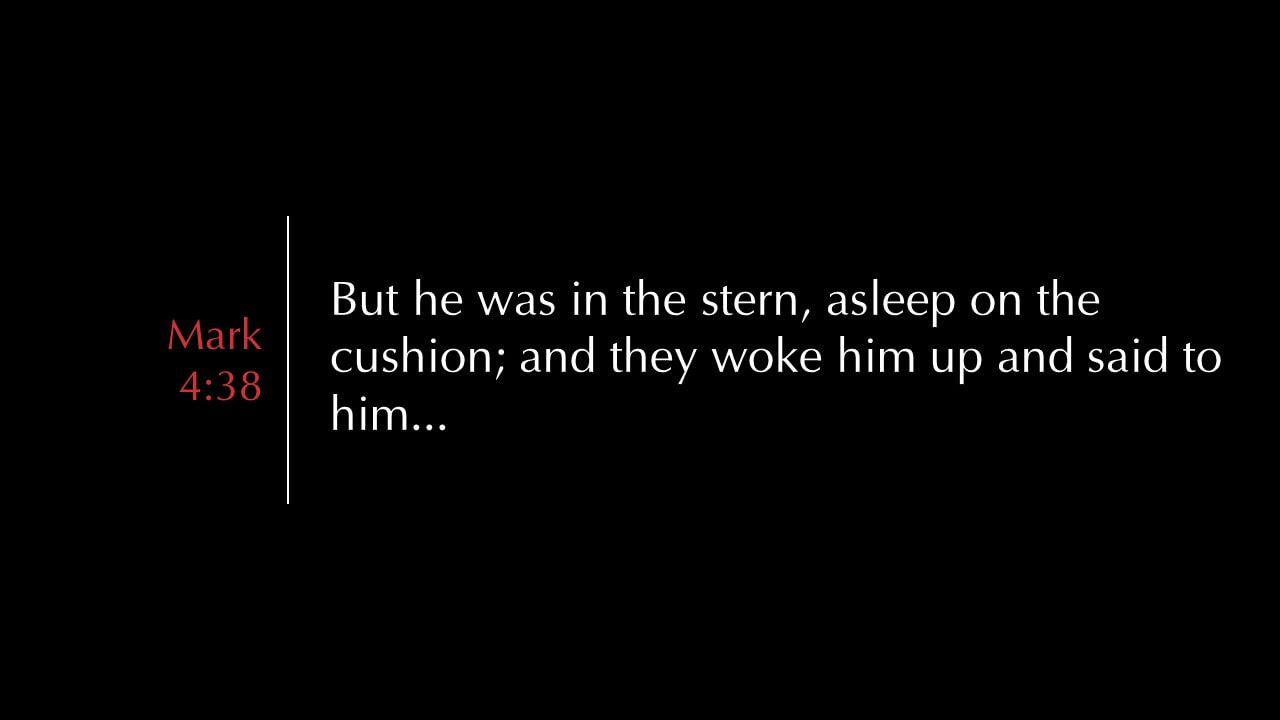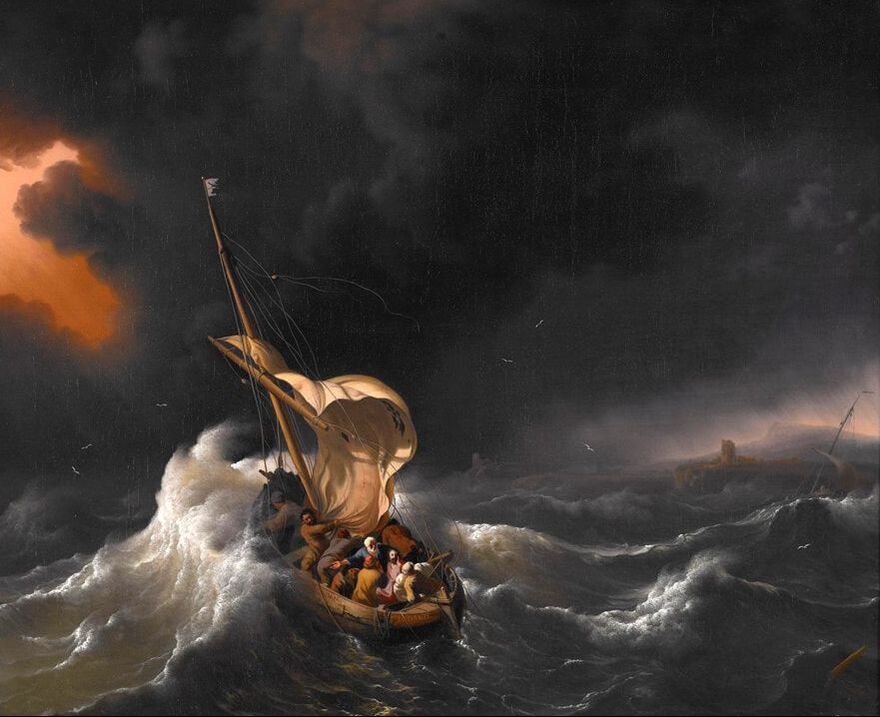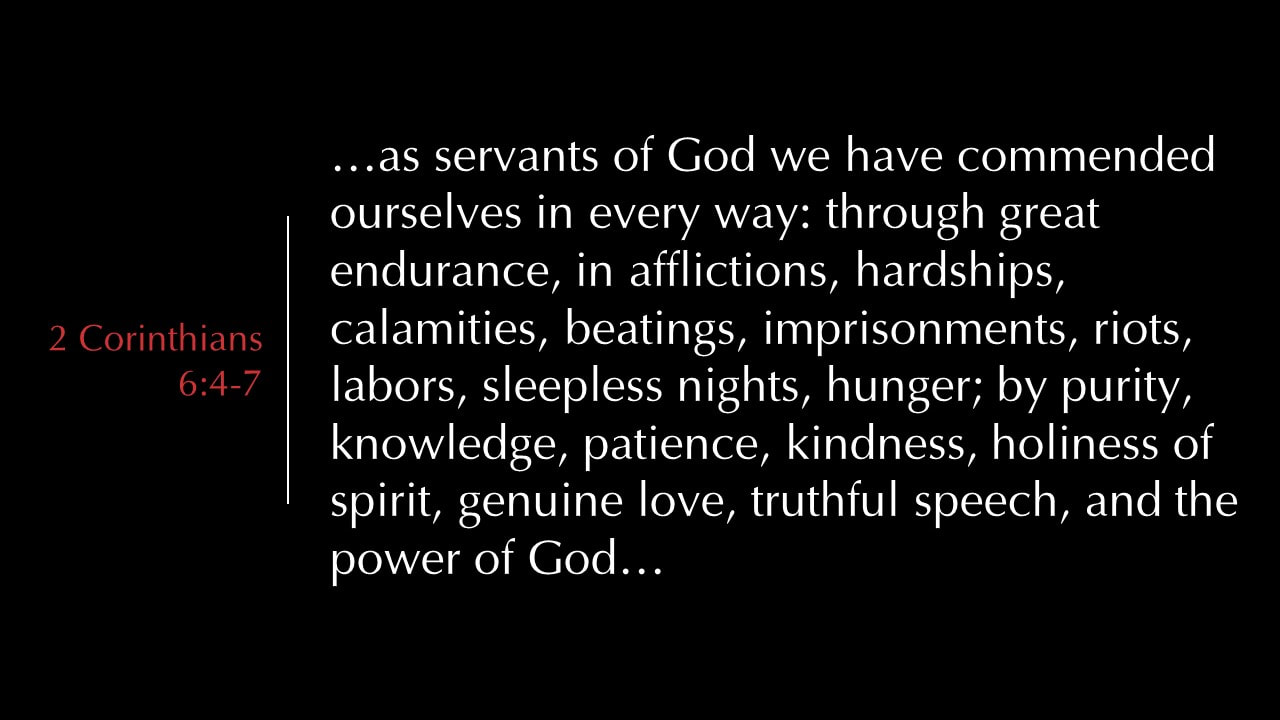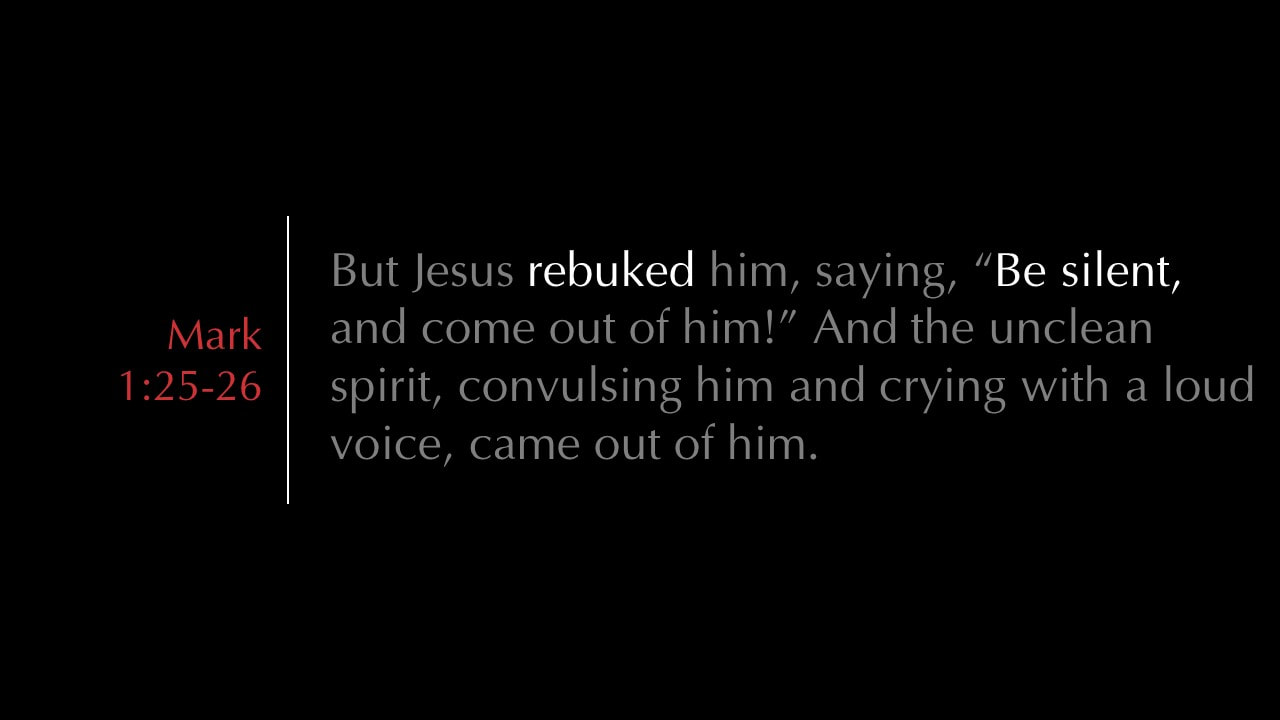Scott Anderson1 Samuel 17:57-18:5, 10-16 † Psalm 133 † 2 Corinthians 6:1-13 † Mark 4:35-41 You can view a video recording of this sermon here. I had never before noticed the cushion. Did you catch it? Jesus was in the back of the boat, asleep on the cushion before they woke him up. That’s a peculiar detail that is included only in Mark. I mean, what are we talking about here? Was it some kind of flotation device or seat pad? Maybe it was something more practical for the skipper. I mean, how luxurious was this setup? I did have to laugh though when I read this detail in my research: “… it is important to avoid a translation which would suggest that Jesus was so small or coiled up as to be able to sleep on a single pillow.”[i] Noted, although did we really consider that a problem before? In the spirit of not making too much of this, it is good for us to remember that the story of a sea crossing and a storm and Jesus calming the waves is also in Matthew and Luke which were composed after Mark and knew of Mark. Each of them tells the story a little differently, and for different emphasis, but we can assume it is worth paying some attention to given they all tell it. So let’s do that. Let’s look a little closer. We are into the fourth chapter of Mark and here’s what has happened so far in this short, fast-paced gospel. Jesus has undermined and challenged the religious leaders of the day not only by criticizing them, but by disregarding their pious rules and at the same time outdoing them in doing good. He’s performed an exorcism, healed a paralytic, on the Sabbath. He’s eaten with sinners—terrible people, according to some. He takes corn from the field for his disciples to eat—again on the Sabbath, the one day you are not to do these things—rather than fasting like the Pharisees. He heals a leper, and, icing on the cake, questions the meaning of family. Who are my mother and my brothers?... Does this sound to you like someone who is happy with the status quo? Does this sound to you like somebody who doesn’t question authority? Does this sound to you like someone who stays away from politics? Does this sound to you like someone who is trying to keep the peace? Then he starts to teach. He tells stories. A sower who scatters seed everywhere. A lamp that is either hidden under a basket or put on a lampstand. A tiny mustard seed—an unwanted, noxious weed that grows like crazy and becomes a home for the birds. Stories that are all about new ways of seeing and understanding how God works and what God is creating—often in the face of the gaslighting and manipulation and the brazen opposition of those who are entrusted with our well-being that is as familiar today as it was then. A storm is surely brewing. And then he gets into the boat. What do we expect is going to happen? By the way, no cushion here, as far as I can see. The cushion aside, we can imagine how Jesus might simply be exhausted—so bone tired that he could have slept anywhere. It is not easy to push against such resistance for so long. And Mark’s pace, and the resistance Jesus is confronted with, is exhausting. We might call to mind the grocery list familiar to the early church at Corinth: afflictions, hardships, calamities, beatings, imprisonments, riots, labors, sleepless nights, hunger. And along with them, the endurance of character required to hold on through the contention that always surrounds change: purity, knowledge, patience, kindness, holiness of spirit, genuine love, truthful speech.[ii] We all know something of this from our own experiences. And having seen what we’ve seen these past 16 months of the unequal experience of hardship and suffering, of access to health care and stable housing, generational wealth and simple dignity, and of real sea crossings for refugees seeking a better life, our hearts are surely drawn all the more to our human siblings who have endured what I and perhaps you cannot fully imagine. That’s one reason I love the story from Samuel in today’s texts. Some of our ecumenical siblings are reading Job today along with the gospel text. We have in past years. In that text, God speaks to Job out of the whirlwind, essentially challenging his doubt with God’s power as seen in creation. Mark mirrors this, for sure, as Jesus doesn’t just speak to the wind and the waves. He rebukes them; he silences them—just as he rebuked and silenced the demon earlier. There is no doubt that themes of creation over the waters are being intentionally invoked in this story to underscore that this is no ordinary man and no ordinary power. Indeed, the disciples are left wondering: who is this, that even the wind and the waves obey him? But the story of David and Jonathan brings out another angle that is perhaps even more operative for us in these days: the power of friendship and companionship. The power of community for the endurance required to get to the other side. Here we have this story of David, Israel’s superlative leader facing afflictions, hardships, calamities, beatings, labors, sleepless nights, hungers—and not just because of his enemies. And yet, there is Jonathan, a lifeline, a source of buoyancy and relief amidst chaos and uncertainty. If we are not yet on the front lines working for the change in our world that must still come, surely we can in the meantime be a partner, an ally, a friend, like Jonathan. There is another detail that catches me in this particular telling of the crossing. It is there in verse 36 As they crossed, there were other boats with him. Could that be us? Amidst all the struggle and challenge, amidst the exhaustion, there was a growing chorus of followers along for the journey, braving the storm together. Perhaps they could see the storm coming. Perhaps they could see beyond it to the other side where others who were never counted waited for the promise to come. You will recall we are only in chapter four. The storm was sure to come, just as it is any time we challenge the forces of chaos. And Mark makes it clear this isn’t your everyday storm. This is about something bigger, about something cosmic. Who among us would not compare the present time with its racism, violence, pandemic illness, economic injustice and environmental destruction to an existential challenge to our lives and to the world as we know it? Who among us would not understand this as a storm of cosmic proportions? So Mark’s Jesus takes us into a whirlwind that is stoked any time a new world order is rising. And we see what it looks like in the coming chapters where we find stories of compassion, of healing, of feeding, of radical inclusion, of astonishing hospitality. A further shore is surely reachable from here where there is more compassion, less consumption, more humility, less profit-taking, more neighborliness, less racism. We can see it too can’t we?—signs that something new is possible. We blink and suddenly we have a new national holiday, and a much better awareness, even among we who are more privileged, of our true history and of the work still to be done than we did even a few short months ago.
Let’s go back to that painting one more time, to catch one last detail. Jesus was sleeping on a cushion, yes. We’ve covered that. The story also notes he was sleeping at the stern—the back of the boat. What else do we find at the stern? It is where the rudder is. It is where the one who is directing things—no matter storm or calm—is located. Truth be told, that’s probably what the cushion was for. Who is this one who controls the wind and the waves? Who is this one who holds back the storm with a word? It is the very same one to whom we can entrust the storms that rage in our own lives, who makes ways for peace and gets us to the other side. Thanks be to God. Notes: [i] Johannes P. Louw and Eugene Albert Nida, Greek-English Lexicon of the New Testament: Based on Semantic Domains (New York: United Bible Societies, 1996), 66. [ii] 2 Corinthians 6:4-7.
0 Comments
Leave a Reply. |
St. Andrew SermonsCategories
All
|







 RSS Feed
RSS Feed